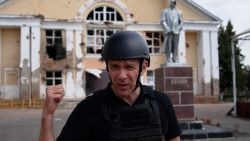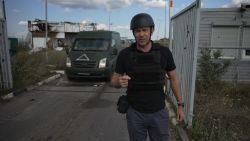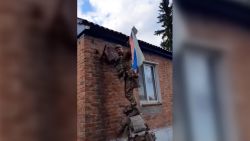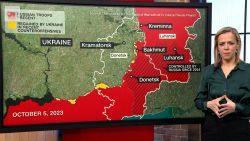Nikita Chibrin says he still remembers his fellow Russian soldiers running away after allegedly raping two Ukrainian women during their deployment northwest of Kyiv in March.
“I saw them run, then I learned they were rapists. They raped a mother and a daughter,” he said. Their commanders, Chibrin said, shrugged when finding out about the rapes. The alleged rapists were beaten, he says, but never fully punished for their crimes.
“They were never jailed. Just fired. Just like that: ‘Go!’ They were simply dismissed from the war. That’s it.”
Chibrin is a former soldier from the Russian city of Yakutsk who says he served in the 64th Separate Guards Motor Rifle Brigade, the notorious Russian military unit accused of committing war crimes during their offensive in Bucha, Borodianka and other towns and villages north of Kyiv.
He deserted from the Russian military in September and fled to Europe via Belarus and Kazakhstan.
Troops from Chibrin’s brigade were labeled war criminals by the Ukrainian Ministry of Defense in April after mass graves containing murdered civilians and dead bodies lying in the streets were discovered following the withdrawal of Russian forces from the Kyiv region.
Chibrin’s military documents, seen by CNN, show his commander was Azatbek Omurbekov, the officer in charge of the 64th Separate Guards Motor Rifle Brigade. Omurbekov, known as the “Butcher of Bucha” is under sanctions by the European Union and the United Kingdom. The United States have sanctioned the entire brigade.
The Kremlin has denied any involvement in the mass killings, while reiterating baseless claims that the images of civilian bodies were fake.
In a move that sparked outrage across the world, Russian President Vladimir Putin awarded the unit an honorary military title and praised it for its “heroism” and “bold actions.”
Chibrin said he didn’t see any of the supposed heroism, but many of the crimes.
Speaking to CNN in a European country where he has requested asylum, he detailed some of the crimes he says he witnessed and heard accounts of, and said he’d be prepared to testify against his unit at an international criminal court. He maintains he himself didn’t commit any crimes.
“I didn’t see murders but I saw rapists running away, being chased (by higher-ranking members of the unit) because they committed rape,” he said.

He also said that the unit had a “direct command to murder” anyone sharing information about the unit’s positions, whether military or civilians.
“If someone had a phone – we were allowed to shoot them,” he said. He claims there is little doubt some of the men in the 64th Separate Guards Motor Rifle Brigade were capable of killing unarmed civilians.
“There are maniacs who enjoy killing a man. Such maniacs turned up there,” he said.
Chibrin also described widespread looting, with Russian soldiers taking computers, jewelry and anything they liked.
“They didn’t hide this at all. A lot from my unit, when we left Lipovka and Andreevka in the end of March, they took cars, vehicles, they took civilian cars and sold them in Belarus,” he said. “The mentality is, if you steal something, you are good. If nobody catches you, good! If you see something that is expensive and you steal it and don’t get caught, you are good.”
As for the unit’s commanders, he said they were well aware of the alleged rapes and murders and of the looting, but took little interest in seeking justice.
“They reacted like: ‘Whatever. It happened. So what?’ Actually, there was no reaction,” he said. “Discipline goes [down the drain], there’s no discipline.”
CNN has asked the Russian Ministry of Defense for comment on the allegations, but has not received a response.
Chibrin has no doubt that Russia will eventually lose its war against Ukraine, but not until many more lives are lost.
“Because Russia won’t stop until big blood is spilled, until everyone dies. Soldiers are cannon fodder to them. They don’t respect them,” he said.
Having seen the fighting first hand, he said the equipment Russian soldiers have is no match for the weapons to which Ukraine has access. He says that while Ukraine is receiving some of the most advanced weaponry available from its Western allies, the Russian army is relying on Soviet-era equipment used during the war in Afghanistan in the 1980s.
“Of course Russia will lose. Because the whole world is supporting Ukraine. To think that they (the Russians) will win is stupid,” he said. “They thought they would occupy Kyiv in three days. What day is it now [of the war]? 260th? They thought they would come to Ukraine and be met with flowers. But they were told to f*** off and thrown Molotov cocktails at.”

‘They lied to us’
Men in his unit were also extremely ill-prepared for combat, according to Chibrin. He said the training his unit received consisted of commanders giving them a weapon, a target and 5,000 bullets.
“Keep shooting and then you are free to go. No one was doing anything. There was no actual training. I worked with a computer, at the office, worked as a lawnmower…” he said.
The lack of training became obvious once in Ukraine. The same men who were boasting about being “like Rambo” before they were deployed came back broken, he said. “Those who said they’d be shooting Ukrainians easily, when they come back from the front lines … they could not even speak to me. They saw the war, they saw defeat, saw their [fellow] combatants being murdered, saw corpses. They realized – but they couldn’t run away.”
He said many of the men were poorly trained and most had no idea where they were headed.
“It was a big lie. It was a military training with the Belarusian army. And they lied to us. On February 24 they just said everyone will go to war,” Chibrin said, adding that he initially refused to go.
“The first thing I said was, ‘Commander, f*** you, I don’t want to go to the war’ and he said, ‘Hey you, you will have big problems, you will go to jail and your family will have big problems’ … and he attacked me and put me in a special vehicle and closed the door. And I couldn’t open [it] from inside. So, that’s how I went to Ukraine.”
Chibrin went on to spend months in Ukraine, on and off. When the 64th Separate Guards Motor Rifle Brigade withdrew at the end of March from the area northwest of Kyiv, following the failed offensive there, he and his unit returned to Belarus.
He said he was suffering from a back injury and went to a military hospital in Russia, but was forced to go back to Ukraine in May. This time he was sent to the Kharkiv region in eastern Ukraine, and then spent time in the forests around Izyum.
It was then that he finally found a chance to escape, he said. He noticed that commanders of other units were leaving the area for Russia in a truck and jumped in.
“I jump in [the bed of the truck] and I see, wow, other guys, also leaving Ukraine. And they say we don’t want to [fight the] war, we paid the commander money (to drive). And I am waiting and waiting and then we are near to the Russia border and the car is stopped and the guys are jumping off and I am also jumping off. And I go to the Russia border and I say I need the medical help,” he said.
Once back in Russia, Chibrin said he spent nearly a month in hospital, most of that being bedridden with terrible back pain. But he said he was unable to get proper treatment. “They said that if I wanted to go to a special sanatorium, I needed to sign a paper that said I’d go back to war,” he said.
Refusing to sign, Chibrin said he was getting ready to submit paperwork to get his military contract canceled when the Russian government announced a partial mobilization in September.
“And my friends told me I needed to hide. ‘You need to find place and hide, your contract will not be canceled because of the mobilization,” he said. Knowing he needed to get as far as possible from the far east city of Khabarovsk where he was stationed, Chibrin first fled across Russia to St. Petersburg and then took a train to Belarus. Once there he was able to find an intermediary who helped him get to Kazakhstan from where he ultimately traveled to his current location.
Now he is determined to speak up about the events he witnessed in Ukraine, even writing an anti-war song. “Hundreds of souls, hundreds of bodies of lost people. Hundreds of mothers without children,” the chorus goes.
Eugene Shapovalov and Katharina Krebs contributed reporting.
























